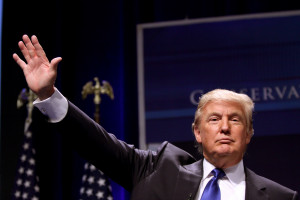Democracy is in crisis, but it’s not too late to save it

The United States has – albeit narrowly – elected a president running on a fascist platform: racist, Islamophobic and profoundly authoritarian, showing utter disrespect for the constitutional limits placed on the presidency, and threatening to imprison his political opponents. We have good reason to believe he is a serial rapist and sexual abuser and a deep misogyny pervaded his campaign from start to finish. The Klu Klux Klan have congratulated him on victory. All signs suggest that all religious minorities, anyone who isn’t white, women, and LGBT people all have particular reason to fear his election (I leave aside for now the fact that everyone on the planet probably does, and that his promises to help the disaffected white voters to whom he appealed cannot be kept, being based in racist caricature rather than reality). He is also likely to be able to make big policy changes, as the senate and congress both have Republican majorities (though, in fairness, not fascist majorities – this might limit the extent of the wrong he can do).
This means that respect for basic human rights, especially of the vulnerable and those considered ‘other’, is in grave jeopardy in the US. Though the situation is less extreme, there are worrying parallels in the UK, which is seeing a rise in racist, anti-immigrant feeling and policies in the wake of Brexit. Many parts of Europe are undergoing similar trends.
Our societies are already deeply racist. Now we stand on a precipice, about to tumble into the abyss. It will be argued that this is what people voted for; Americans voted for mass deportations of immigrants, for a Muslim register, and for many other policies that disregard the inherent value of the human person. Enacting these policies is democratic. This is democracy, we hear. Many adduce that as a defence. Others are led by it to question the value of democracy. Both of these attitudes are operating with a misguided notion of democracy as majority-rule.
As we seek to guard against the rising tide of racism and fascism, we need to return to the roots of democracy. Democracy is not simply majority rule, but collective self-rule. When I say that democracy is collective self-rule, I am partly making a claim about what I think democracy should be, and about what it often spectacularly fails to be. However, this interpretation of democracy is grounded in its history. The self-rule principle, though tragically not the practice, goes back to the roots of modern democratic thinking, in the English civil war and the American Revolution. It’s why there are constitutions (I’ve talked about this before in another context). The idea, at root, is that no one has inherent right to power over anyone else, so we all have equal input into deciding how collective action is taken; sometimes, practically, we do have to do this by majority vote, but democracy does not simply respect majority. Democracy respects autonomy. This precludes encroachment on the person, and all persons equally, within a democratic state.
This is not yet all there is to democracy. Why does democracy respect autonomy? Because it respects the human person; it recognises that human beings are inherently and equally valuable. This involves a richer understanding of human value, grounded not just in the individual’s sacrosanct power, but also in recognising the individual’s vulnerability before others, and need for them and, at times, need for protection from them. Appreciating this can foster a more caring society that values humility and compassion – qualities antithetical to Donald Trump’s campaign.
A nation can democratically elect Donald Trump. His threatened policies cannot be democratically enacted. The same goes for racist policies to arise from Brexit. Racism is undemocratic.
In the context of Trump, I have seen many references to Plato’s idea that democracy is self-destructive (Plato is thinking of Athenian democracy, incomparable with modern democracy in terms of the underlying ideas about human nature). What I have said so far might seem to confirm this; collective self-rule has done away with its underlying principles. Democracy can indeed be self-destructive. Perhaps it is self-destructing now. However, it is not inherently self-destructive, because it is not inherently doing what the majority wants.
Democracy is in danger, but it is not too late to save it. If we are to save democracy and protect the minorities currently under threat, we must not allow the far right to steal the language of democracy. We must not simply shout at them that they are wrong. Rather, we must fight for a deeper, more genuine democracy that values everyone.




Leave a Reply